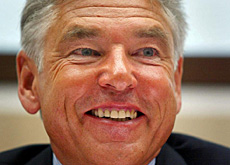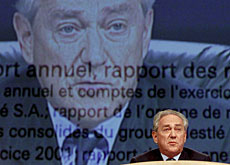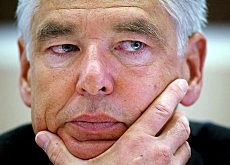Nestlé corporate governance row heats up

Plans by Nestlé's CEO to double up as chairman have sparked a war of words that threatens to overshadow Thursday’s annual shareholders’ meeting.
CEO Peter Brabeck, the Swiss food giant’s choice to succeed Rainer Gut as board chairman, has upped the stakes by threatening to resign if he doesn’t get his way.
The company issued a statement on Monday denying press reports that the entire board had also threatened to step down if shareholders who oppose the double mandate succeed in derailing the plan.
But Swiss newspapers are standing by the original claims, pointing out that both Brabeck and company spokesmen had confirmed their information.
Opposition to the double mandate is led by Dominique Biedermann of Switzerland’s Ethos Investment Foundation.
“Brabeck is trying to personalise the issue, but our resolutions remain on the level of principles of corporate governance,” he told swissinfo.
Biedermann, whose foundation represents 83 Swiss pension funds and administers SFr875 million of investment funds, added: “If a majority were to approve our resolutions, board members could not just resign.
“They would have to assume their responsibilities and put in place a structure that represented the wishes of shareholders.”
Nestlé says that splitting the roles would “sacrifice stability and continuity”.
It also argues that there is no other “suitable” candidate, and adds that two new vice chairmen will be appointed to “maintain the necessary checks and balances”.
All for one?
Brabeck himself said in a speech last month: “If we want governance schemes that actually work in a real business environment, they must be based on principles, not on detailed rules that try to pre-empt all the eventualities a lawyer can think of.”
Ethos, which has the support of a number of other institutional investors including American giant Institutional Shareholder Services, reacted particularly strongly to the argument that there is no other suitable candidate.
“We have known for a long time that this situation would arise – five years, to be exact,” said Biedermann. “It was announced in 2000 that Rainer Gut would retire as chairman this year.”
Biedermann said finding a suitable candidate was the responsibility of the five-member selection committee of the Nestlé board.
The committee acts as a liaison body between the executive management and the board – and is currently led by Gut and Brabeck himself.
Food for thought
Biedermann said Ethos had no problem with Brabeck either assuming the chairmanship or remaining as CEO.
However, combining the two positions was a move that could only be justified by exceptional circumstances – and this was clearly not the case at Nestlé.
“We believe Nestle is swimming against the tide,” said Biedermann. “Every year, there are fewer companies in Switzerland [that retain this dual model].”
Among the major international Swiss companies, Biedermann said only three still retained the double mandate system common in the United States: pharma giants Novartis and Roche and chemical company Ciba.
Such arguments have also won support in academic circles.
Ulrich Thielemann, professor of business ethics at St Gallen University, told swissinfo: “It is always going to be questionable when so much power is concentrated in one pair of hands.
“As an outsider, one has to wonder that the balance of power is now such that Brabeck can actually allow himself to take such a step.”
Strongman myth
Such arguments notwithstanding, a clear majority of investors do apparently support Nestlé’s move towards a double mandate.
Hans-Peter Wiedmer, of the Bernische Pensionskasse pension fund, argues that Brabeck has an excellent track record and that Nestlé has good internal controls.
Many investors like Brabeck because, under his leadership, Nestlé has begun moving away from being a “mere” food processor to positioning itself as a leading player in the more profitable field of nutritional “added value”.
Biedermann himself accepts that he is not likely to win a majority, but stresses that a sizeable protest – possibly of about 20 per cent –would “send a clear signal”.
Vontobel analyst René Weber agrees, saying: “That would certainly give a sign that the double mandate will not feature in the foreground in Switzerland in future.”
swissinfo, Chris Lewis
Ethos, which administers SFr875 million of investment funds, has presented three resolutions to the meeting.
As well as preventing the “double mandate”, they would reduce directors’ terms of office from five years to three and make it easier to present resolutions to the meeting.
Ethos has the backing of five large Swiss pension funds.
CEO Brabeck has threatened to resign if the annual meeting does not also confirm him as chairman.
But shareholders who oppose the double mandate say they are unimpressed by the threat.
The rebels are unlikely to win more than minority support, but they hope to “send a clear signal” for the future.

In compliance with the JTI standards
More: SWI swissinfo.ch certified by the Journalism Trust Initiative


You can find an overview of ongoing debates with our journalists here. Please join us!
If you want to start a conversation about a topic raised in this article or want to report factual errors, email us at english@swissinfo.ch.